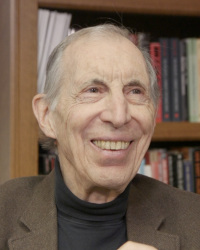Tony Essaye was born in London, England but grew up in the U.S. after being evacuated during World War II. He joined ROTC during his college years at Georgetown and was stationed in Japan during the 1950s. Essaye went on to become a lawyer and served as a counsel for the Peace Corps under Sargent Shriver. He was one of the lawyers who represented the Washington Post during the Pentagon Papers cases; actor Zach Woods portrays Essaye in the 2017 film “The Post.” He went on to work in a legal capacity for various political campaigns and politicians, including for Walter Mondale and Bill and Hillary Clinton. He also co-founded the International Senior Lawyers Project.
In Essaye’s interview for the AHF, he says, “… You know, my life experience World War II and the Cold War and the overhanging nuclear threat. I had really hoped in the early 1990’s when the Soviet Union came to what appeared to be a demise through more than anything else, the whole nuclear standoff, I think, that things would change and that at least there was a very substantial chance that countries would move towards less autocratic ownership, more of a democracy, more of a peaceful relationship between countries and less rivalry and so forth. That in the end, nuclear research and the atomic bomb would create a peaceful environment rather than a war environment, and that the Great Powers themselves could then as a group really intervene in smaller conflicts, and have a much greater chance of having a peaceful earth rather than a world that was full of military combat.
It’s just been very frustrating and disappointing to see—in the last few years, in particular—how that has not evolved and how much work has to be done, really to maintain democracy, that it doesn’t maintain itself. That it seems to be a natural instinct in mankind, where democracy is not being effective, to slip back to autocratic government and all of the abilities it brings to cut through logjams and create results, at the expense of freedom and at the expense of people who are not in favor with the autocracy. So many downsides. One integral part of democracy is some degree of willingness on the part of people who don’t agree with each other to come together and try to forge agreement, at least in some areas.”





